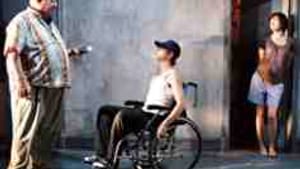Stay in the Loop
BSR publishes on a weekly schedule, with an email newsletter every Wednesday and Thursday morning. There’s no paywall, and subscribing is always free.
Grungy, grungier and grungiest
Adam Rapp's "Hallway Trilogy' in New York

Three full-length new plays by Adam Rapp premiering as a trilogy (and as a marathon on Sundays) should be a major theatrical event. It's not.
Rapp (best known for recent productions of Nocturne, Blackbird and Red Light Winter) is highly regarded: He's young, daring and prolific. But in The Hallway Trilogy, the courageous actors and generously accommodating Rattlestick Theatre are stuck with what turns out to be sloppy, empty playwriting and schlock shock tactics. With all due respect to the special effects designer Jeremy Chernick, gushing blood and smeared feces do not a drama make— much less three dramas.
The hallway of the title (designed by Beowulf Boritt) is the locale for all three plays, and because it's a hallway, Rattlestick has reconfigured its seating to create a stage the length of its former width; this means that watching it feels like the head-swiveling equivalent of watching a tennis match.
In Rose, the time is 1953; we're in a grungy gray hallway in a Lower East Side apartment building. Fifty years later, in Paraffin, the same hallway is even grungier but with shiny new locks on its beat-up doors.
Add fifty years again and, in Nursing, the future hallway looks even worse, only now this is faux grunge and we're looking through glass into a museum exhibit. Well, more like a zoo, since the exhibition is alive (Rapp apparently thinks nobody remembers Kubrick's 2001). The upright piano incongruously stuck in the hallway endures through the three plays, although its purpose—even as various characters play it—seems merely decorative.
Obsessed with O'Neill
In Rose, directed by Rapp, the title character, Rose (Katherine Waterston) who claims to be an actress, is obsessed with Eugene O'Neill; the play opens on the day after his death. After a failed audition a year earlier, Rose receives a praiseful letter, and the return address leads her to one Eugene O'Neill living in apartment #10 at the end of the hallway. She is clearly nuts, and we will discover later just how nuts, and why the well-intentioned letter has such disastrous consequences.
In the course of Rose's wait in the hallway, we'll meet many other residents, all weird or unhappy, including a funny Russian (William Apps) and an inexplicable loony (Nick Lawson) who doesn't speak but leaps and prances and scatters marbles around. The undeveloped political agenda is the Cold War, with the McCarthy era manifested in egg throwing at a building housing Russians.
Repulsive married couple
In Paraffin, directed by Daniel Aukin, the title refers to the candles on the first night of the East Coast blackout of 2003. Here the central characters are a repulsive married couple: Denny (Apps again), a druggy lowlife, and his pregnant wife (Julianne Nicholson). Denny's brother, Lucas (Jeremy Strong), stuck in a wheelchair with a Glock and a bunch of bitterness, is in love with his sister-in-law. Violence (machetes!) and ugliness (we watch a man who has soiled himself while unconscious after a drug binge remove his clothes and clean himself off) ensue.
All of this, despite all the commotion and hideous sights, remains stupefyingly boring. The undeveloped political agenda here is the war in Afghanistan, the source of Lucas's injuries (but not of his bitterness). There is a mention of the ghost of Rose, but nothing much develops from this obvious link, unless you count the smell behind the wall mentioned later in the third play.
Museum of diseases
In Nursing, directed by Trip Cullman, the hallway is now separated from the audience by a red curtain, dragged open and closed by a tour guide (Sue Jean Kim— her retro costume and perky manner and the entire device seem lifted from George C. Wolfe's The Colored Museum of 1985). This is a museum in the disease-free future, when children don't know what "sick" means, guarded by a Darth Vader figure (Stephen Tyrone Williams) who's been sensitized by his brutal experiences in Afghanistan.
Behind the glass lies a man (Logan Marshall-Green) on a mattress. He has volunteered (why?) to be infected with dread diseases (bubonic plague, cholera) and then brought back from the brink of death (again, why?). The public comes to the museum to watch his suffering (why?).
He's tended by a deranged nurse who belongs to a "group," but what their agenda is, other than wanting to revive fatal diseases and then die of them, remains unclear. The characters' motives are all as unintelligible as their personalities, and the entire exercise seems an excuse to perform repulsive acts onstage. More blood. More vomiting. More shit.
From crazy to sad to disgusting
The three scripts pretty much follow the same declension as the set: grungy, grungier and grungiest. The characters proceed similarly: crazy and sad, then crazy and mean, and, finally, crazy and disgusting. What a pity that such good actors are wasted on such stuff.
Sample dialogue from Nursing: "As I descend to you, baring my spotted arms and dim teeth, as I hurl myself into your arms and give you this beautiful, perfect plague, will you still love me?... My tongue blackening. The jellies of my eyes melting into the back of my throat." Still love her?
To add insult to injury, the scripts blatantly use filler: an audition piece from Desire Under the Elms is performed twice; a long speech is repeated verbatim by the person to whom it's addressed; a long Kipling poem is recited, and a Dr. Seuss book is read aloud in its entirety.
Gruesome and outrageous mayhem has abounded on stages lately— think of Luna Theater's brilliant production of Blasted, Abbey Theatre's stunning Terminus, and Exile's The Lieutenant of Inishmore. Those plays earn their shock effects, unlike Adam Rapp's deplorable Hallway Trilogy.
Rapp (best known for recent productions of Nocturne, Blackbird and Red Light Winter) is highly regarded: He's young, daring and prolific. But in The Hallway Trilogy, the courageous actors and generously accommodating Rattlestick Theatre are stuck with what turns out to be sloppy, empty playwriting and schlock shock tactics. With all due respect to the special effects designer Jeremy Chernick, gushing blood and smeared feces do not a drama make— much less three dramas.
The hallway of the title (designed by Beowulf Boritt) is the locale for all three plays, and because it's a hallway, Rattlestick has reconfigured its seating to create a stage the length of its former width; this means that watching it feels like the head-swiveling equivalent of watching a tennis match.
In Rose, the time is 1953; we're in a grungy gray hallway in a Lower East Side apartment building. Fifty years later, in Paraffin, the same hallway is even grungier but with shiny new locks on its beat-up doors.
Add fifty years again and, in Nursing, the future hallway looks even worse, only now this is faux grunge and we're looking through glass into a museum exhibit. Well, more like a zoo, since the exhibition is alive (Rapp apparently thinks nobody remembers Kubrick's 2001). The upright piano incongruously stuck in the hallway endures through the three plays, although its purpose—even as various characters play it—seems merely decorative.
Obsessed with O'Neill
In Rose, directed by Rapp, the title character, Rose (Katherine Waterston) who claims to be an actress, is obsessed with Eugene O'Neill; the play opens on the day after his death. After a failed audition a year earlier, Rose receives a praiseful letter, and the return address leads her to one Eugene O'Neill living in apartment #10 at the end of the hallway. She is clearly nuts, and we will discover later just how nuts, and why the well-intentioned letter has such disastrous consequences.
In the course of Rose's wait in the hallway, we'll meet many other residents, all weird or unhappy, including a funny Russian (William Apps) and an inexplicable loony (Nick Lawson) who doesn't speak but leaps and prances and scatters marbles around. The undeveloped political agenda is the Cold War, with the McCarthy era manifested in egg throwing at a building housing Russians.
Repulsive married couple
In Paraffin, directed by Daniel Aukin, the title refers to the candles on the first night of the East Coast blackout of 2003. Here the central characters are a repulsive married couple: Denny (Apps again), a druggy lowlife, and his pregnant wife (Julianne Nicholson). Denny's brother, Lucas (Jeremy Strong), stuck in a wheelchair with a Glock and a bunch of bitterness, is in love with his sister-in-law. Violence (machetes!) and ugliness (we watch a man who has soiled himself while unconscious after a drug binge remove his clothes and clean himself off) ensue.
All of this, despite all the commotion and hideous sights, remains stupefyingly boring. The undeveloped political agenda here is the war in Afghanistan, the source of Lucas's injuries (but not of his bitterness). There is a mention of the ghost of Rose, but nothing much develops from this obvious link, unless you count the smell behind the wall mentioned later in the third play.
Museum of diseases
In Nursing, directed by Trip Cullman, the hallway is now separated from the audience by a red curtain, dragged open and closed by a tour guide (Sue Jean Kim— her retro costume and perky manner and the entire device seem lifted from George C. Wolfe's The Colored Museum of 1985). This is a museum in the disease-free future, when children don't know what "sick" means, guarded by a Darth Vader figure (Stephen Tyrone Williams) who's been sensitized by his brutal experiences in Afghanistan.
Behind the glass lies a man (Logan Marshall-Green) on a mattress. He has volunteered (why?) to be infected with dread diseases (bubonic plague, cholera) and then brought back from the brink of death (again, why?). The public comes to the museum to watch his suffering (why?).
He's tended by a deranged nurse who belongs to a "group," but what their agenda is, other than wanting to revive fatal diseases and then die of them, remains unclear. The characters' motives are all as unintelligible as their personalities, and the entire exercise seems an excuse to perform repulsive acts onstage. More blood. More vomiting. More shit.
From crazy to sad to disgusting
The three scripts pretty much follow the same declension as the set: grungy, grungier and grungiest. The characters proceed similarly: crazy and sad, then crazy and mean, and, finally, crazy and disgusting. What a pity that such good actors are wasted on such stuff.
Sample dialogue from Nursing: "As I descend to you, baring my spotted arms and dim teeth, as I hurl myself into your arms and give you this beautiful, perfect plague, will you still love me?... My tongue blackening. The jellies of my eyes melting into the back of my throat." Still love her?
To add insult to injury, the scripts blatantly use filler: an audition piece from Desire Under the Elms is performed twice; a long speech is repeated verbatim by the person to whom it's addressed; a long Kipling poem is recited, and a Dr. Seuss book is read aloud in its entirety.
Gruesome and outrageous mayhem has abounded on stages lately— think of Luna Theater's brilliant production of Blasted, Abbey Theatre's stunning Terminus, and Exile's The Lieutenant of Inishmore. Those plays earn their shock effects, unlike Adam Rapp's deplorable Hallway Trilogy.
What, When, Where
The Hallway Trilogy. By Adam Rapp; directed by Rapp, Daniel Aukin and Tripp Cullman. Through March 20, 2011 at Rattlestick Playwrights Theatre, 224 Waverly Pl., New York. ( 212) 627-2556 or www.rattlestick.org.
Sign up for our newsletter
All of the week's new articles, all in one place. Sign up for the free weekly BSR newsletters, and don't miss a conversation.

 Toby Zinman
Toby Zinman